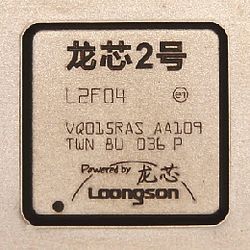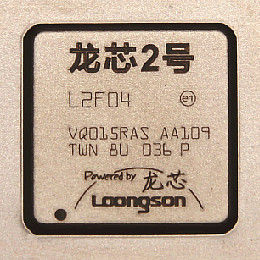From WikiChip
Difference between revisions of "loongson/godson 2/2f"
m (Bot: moving all {{mpu}} to {{chip}}) |
|||
| (9 intermediate revisions by 2 users not shown) | |||
| Line 1: | Line 1: | ||
{{loongson title|Godson-2F}} | {{loongson title|Godson-2F}} | ||
| − | {{ | + | {{chip |
| name = Godson-2F | | name = Godson-2F | ||
| image = godson-2f.jpg | | image = godson-2f.jpg | ||
| Line 9: | Line 9: | ||
| model number = 2F | | model number = 2F | ||
| part number = PLA80 | | part number = PLA80 | ||
| − | | part number | + | | part number 2 = |
| market = Desktop | | market = Desktop | ||
| first announced = July 31, 2007 | | first announced = July 31, 2007 | ||
| Line 39: | Line 39: | ||
| core stepping = | | core stepping = | ||
| process = 90 nm | | process = 90 nm | ||
| − | | transistors = | + | | transistors = 51,000,000 |
| technology = CMOS | | technology = CMOS | ||
| − | | die area = | + | | die area = 43 mm² |
| die width = | | die width = | ||
| die length = | | die length = | ||
| Line 50: | Line 50: | ||
| max memory = | | max memory = | ||
| − | + | ||
| power = 5 W | | power = 5 W | ||
| − | | v core = | + | | v core = 1.2 V |
| − | |||
| − | |||
| − | |||
| v io = | | v io = | ||
| v io tolerance = | | v io tolerance = | ||
| Line 79: | Line 76: | ||
| packaging = Yes | | packaging = Yes | ||
| − | | package 0 = | + | | package 0 = HFCBGA-452 |
| − | | package 0 type = | + | | package 0 type = HFCBGA |
| package 0 pins = 452 | | package 0 pins = 452 | ||
| package 0 pitch = | | package 0 pitch = | ||
| Line 90: | Line 87: | ||
}} | }} | ||
'''Godson-2F''' ('''龙芯2F''') is a {{arch|64}} [[MIPS]] performance processor developed by [[Institute of Computing Technology of the Chinese Academy of Sciences|ICT]] and later [[Loongson]] for desktop computers. Introduced in mid-[[2008]], the Godson-2F operates at up to 800 MHz consuming 5 W. This chip was manufactured on [[STMicroelectronics]]' [[90 nm process]]. | '''Godson-2F''' ('''龙芯2F''') is a {{arch|64}} [[MIPS]] performance processor developed by [[Institute of Computing Technology of the Chinese Academy of Sciences|ICT]] and later [[Loongson]] for desktop computers. Introduced in mid-[[2008]], the Godson-2F operates at up to 800 MHz consuming 5 W. This chip was manufactured on [[STMicroelectronics]]' [[90 nm process]]. | ||
| + | |||
| + | The Godson-2F features a faster memory controller (supporting up to DDR2-667) and integrates some of the functionality of the [[southbridge]] including a PCI-X controller and more general-purpose I/O pins. | ||
| + | |||
| + | == Cache == | ||
| + | {{main|loongson/microarchitectures/GS464#Memory_Hierarchy|l1=GS464 § Cache}} | ||
| + | {{cache size | ||
| + | |l1 cache=128 KiB | ||
| + | |l1i cache=64 KiB | ||
| + | |l1i break=1x64 KiB | ||
| + | |l1i desc=4-way set associative | ||
| + | |l1d cache=64 KiB | ||
| + | |l1d break=1x64 KiB | ||
| + | |l1d desc=4-way set associative | ||
| + | |l1d policy= | ||
| + | |l2 cache=512 KiB | ||
| + | |l2 break=1x512 KiB | ||
| + | |l2 desc=4-way set associative | ||
| + | |l2 policy= | ||
| + | }} | ||
| + | |||
| + | == Memory controller == | ||
| + | {{memory controller | ||
| + | |type=DDR2-667 | ||
| + | |ecc=Yes | ||
| + | |max mem=4 GiB | ||
| + | |controllers=1 | ||
| + | |channels=1 | ||
| + | |max bandwidth=9.934 GiB/s | ||
| + | |bandwidth schan=9.934 GiB/s | ||
| + | }} | ||
| + | |||
| + | == Expansions == | ||
| + | This chip has integrated [[HyperTransport]] 1.0 operating at 400 MHz. | ||
| + | {{expansions | ||
| + | |pci width = 32 bit | ||
| + | |pci clock = 66 MHz | ||
| + | |pci revision=2.3 | ||
| + | |pcix width = 32 bit | ||
| + | |pcix revision=1.0b | ||
| + | |pcix clock = 133 MHz | ||
| + | |lpc revision=1.1 | ||
| + | }} | ||
| + | |||
| + | == Graphics == | ||
| + | This chip had no [[integrated graphics processing unit]]. | ||
| + | |||
| + | == Die Shot == | ||
| + | * [[90 nm process]] | ||
| + | * 51,000,000 transistors | ||
| + | * 43 mm² die size | ||
| + | [[File:godson-2f die shot.png]] | ||
| + | |||
| + | == Datasheet == | ||
| + | * [[:File:godson 2f ds (v1.1).pdf|Godson 2F Datasheet (V1.1)]] | ||
| + | |||
| + | == References == | ||
| + | * Hu, Wei-Wu, and Jian Wang. "Making effective decisions in computer architects’ real-world: Lessons and experiences with Godson-2 processor designs." Journal of Computer Science and Technology 23.4 (2008): 620-632. | ||
Latest revision as of 15:31, 13 December 2017
| Edit Values | |
| Godson-2F | |
 | |
| Godson-2F chip | |
| General Info | |
| Designer | Loongson |
| Manufacturer | STMicroelectronics |
| Model Number | 2F |
| Part Number | PLA80 |
| Market | Desktop |
| Introduction | July 31, 2007 (announced) June, 2008 (launched) |
| General Specs | |
| Family | Godson 2 |
| Series | Godson 2 |
| Frequency | 800 MHz |
| Microarchitecture | |
| ISA | MIPS64 (MIPS) |
| Microarchitecture | GS464 |
| Core Name | GS464 |
| Process | 90 nm |
| Transistors | 51,000,000 |
| Technology | CMOS |
| Die | 43 mm² |
| Word Size | 64 bit |
| Cores | 1 |
| Threads | 1 |
| Multiprocessing | |
| Max SMP | 1-Way (Uniprocessor) |
| Electrical | |
| Power dissipation | 5 W |
| Vcore | 1.2 V |
Godson-2F (龙芯2F) is a 64-bit MIPS performance processor developed by ICT and later Loongson for desktop computers. Introduced in mid-2008, the Godson-2F operates at up to 800 MHz consuming 5 W. This chip was manufactured on STMicroelectronics' 90 nm process.
The Godson-2F features a faster memory controller (supporting up to DDR2-667) and integrates some of the functionality of the southbridge including a PCI-X controller and more general-purpose I/O pins.
Cache[edit]
- Main article: GS464 § Cache
|
Cache Organization
Cache is a hardware component containing a relatively small and extremely fast memory designed to speed up the performance of a CPU by preparing ahead of time the data it needs to read from a relatively slower medium such as main memory. The organization and amount of cache can have a large impact on the performance, power consumption, die size, and consequently cost of the IC. Cache is specified by its size, number of sets, associativity, block size, sub-block size, and fetch and write-back policies. Note: All units are in kibibytes and mebibytes. |
|||||||||||||||||||||||||
|
|||||||||||||||||||||||||
Memory controller[edit]
|
Integrated Memory Controller
|
||||||||||||||
|
||||||||||||||
Expansions[edit]
This chip has integrated HyperTransport 1.0 operating at 400 MHz.
|
Expansion Options
|
||||||||||||||||||||
|
||||||||||||||||||||
Graphics[edit]
This chip had no integrated graphics processing unit.
Die Shot[edit]
- 90 nm process
- 51,000,000 transistors
- 43 mm² die size
Datasheet[edit]
References[edit]
- Hu, Wei-Wu, and Jian Wang. "Making effective decisions in computer architects’ real-world: Lessons and experiences with Godson-2 processor designs." Journal of Computer Science and Technology 23.4 (2008): 620-632.
Facts about "Godson-2F - Loongson"
| base frequency | 800 MHz (0.8 GHz, 800,000 kHz) + |
| core count | 1 + |
| core name | GS464 + |
| core voltage | 1.2 V (12 dV, 120 cV, 1,200 mV) + |
| designer | Loongson + |
| die area | 43 mm² (0.0667 in², 0.43 cm², 43,000,000 µm²) + |
| family | Godson 2 + |
| first announced | July 31, 2007 + |
| first launched | June 2008 + |
| full page name | loongson/godson 2/2f + |
| has ecc memory support | true + |
| instance of | microprocessor + |
| isa | MIPS64 + |
| isa family | MIPS + |
| l1$ size | 128 KiB (131,072 B, 0.125 MiB) + |
| l1d$ description | 4-way set associative + |
| l1d$ size | 64 KiB (65,536 B, 0.0625 MiB) + |
| l1i$ description | 4-way set associative + |
| l1i$ size | 64 KiB (65,536 B, 0.0625 MiB) + |
| l2$ description | 4-way set associative + |
| l2$ size | 0.5 MiB (512 KiB, 524,288 B, 4.882812e-4 GiB) + |
| ldate | June 2008 + |
| main image |  + + |
| main image caption | Godson-2F chip + |
| manufacturer | STMicroelectronics + |
| market segment | Desktop + |
| max cpu count | 1 + |
| max memory bandwidth | 9.934 GiB/s (10,172.416 MiB/s, 10.667 GB/s, 10,666.551 MB/s, 0.0097 TiB/s, 0.0107 TB/s) + |
| max memory channels | 1 + |
| microarchitecture | GS464 + |
| model number | 2F + |
| name | Godson-2F + |
| part number | PLA80 + |
| power dissipation | 5 W (5,000 mW, 0.00671 hp, 0.005 kW) + |
| process | 90 nm (0.09 μm, 9.0e-5 mm) + |
| series | Godson 2 + |
| smp max ways | 1 + |
| supported memory type | DDR2-667 + |
| technology | CMOS + |
| thread count | 1 + |
| transistor count | 51,000,000 + |
| word size | 64 bit (8 octets, 16 nibbles) + |
